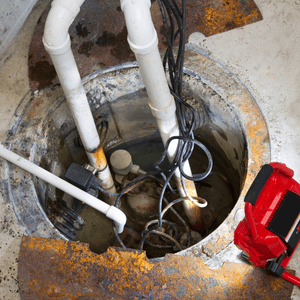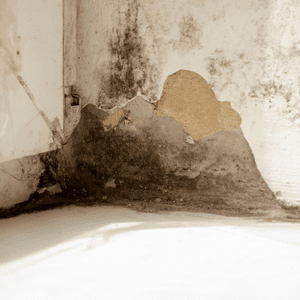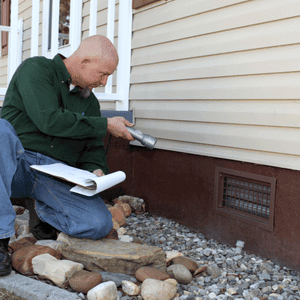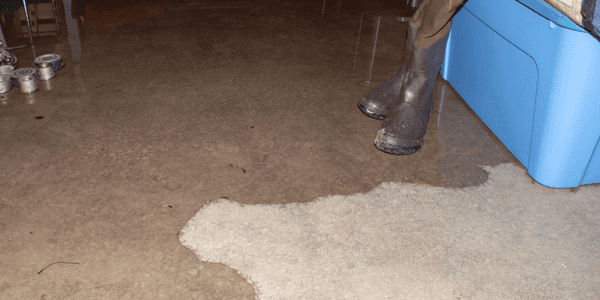You head downstairs to grab something from the basement, only to be greeted by water pooling on the floor. It’s the kind of moment that makes your heart sink. Whether it’s an inch of water or a full-blown flood, a flooded basement can feel like a homeowner’s nightmare.
At Black Hill Restoration, we’ve seen how quickly water damage can turn from bad to worse. The key is acting fast and knowing when it’s time to call in the pros. In this post, we’ll walk you through the common causes of basement flooding, the risks of DIY cleanup, and how to handle the situation without making things worse.
What Causes Basement Flooding? Know the Common Culprits
Understanding why your basement flooded is the first step to fixing the problem—and preventing it from happening again. Here are the usual suspects:
1. Heavy Rain and Storms
In Texas, we’re no strangers to sudden downpours. When rain falls faster than the ground can absorb it, water may seep into your basement through cracks in the foundation or weak spots in your home’s waterproofing.
2. Burst Pipes or Plumbing Leaks
A burst pipe or even a slow, unnoticed plumbing leak can quickly flood your basement. This often happens in winter when pipes freeze and crack.
3. Sewer Backups

If the local sewer system becomes overwhelmed—say, during a heavy storm—water can back up into your home’s basement. This type of flooding is particularly dangerous because it involves contaminated water.
4. Faulty Sump Pumps
A sump pump is your basement’s first line of defense against flooding. If it fails due to a power outage, lack of maintenance, or a mechanical issue, water can quickly accumulate.
5. Poor Gutter and Downspout Maintenance
Clogged gutters and downspouts can cause rainwater to pool around your home’s foundation, eventually making its way inside.
The Risks of DIY Basement Cleanup You Need to Know
When faced with a flooded basement, your first instinct might be to grab a mop and some towels. But here’s the deal—DIY cleanup often causes more harm than good.
1. Contaminated Water Hazards
Not all water is the same. If the flooding involves gray water (from appliances) or black water (from sewage), it can carry harmful bacteria and viruses. Without proper protective gear, you’re putting your health at risk.
2. Electrical Dangers
Water and electricity don’t mix. A flooded basement could mean submerged electrical outlets or appliances, creating a serious shock hazard.
3. Hidden Moisture Issues
Even if you think you’ve cleaned everything up, moisture can seep into walls, floors, and insulation. This hidden moisture is a breeding ground for mold, which can spread quickly and cause long-term health problems.
4. Incomplete Cleanup
DIY efforts often fall short simply because most homeowners don’t have the industrial-grade equipment needed to extract water and dry out a space completely.
When to Call the Pros: Warning Signs to Watch For
Some flooded basement situations are manageable, but many require professional expertise. Here’s how to tell the difference:
1. Standing Water That Won’t Drain
If your basement has more than a few inches of water and it’s not draining, it’s time to bring in the experts. Professional-grade pumps are often needed to remove large volumes of water.
2. Electrical Hazards
If the floodwater has reached electrical outlets, appliances, or your circuit panel, don’t go near it. Call a professional immediately to ensure safety.

3. Signs of Sewage
If the water smells bad or you suspect it might be contaminated, it’s a job for the pros. Sewage cleanup requires specialized equipment and sanitization techniques.
4. Persistent Odors or Mold Growth
If your basement still smells musty days after you’ve cleaned up or if you spot mold, you’ve got a bigger problem on your hands.
How Professionals Handle a Flooded Basement Step by Step
When you call Black Hill Restoration, we don’t just show up with buckets and mops. Our team uses proven methods and state-of-the-art equipment to handle even the worst flooding situations. Here’s what you can expect:
1. Assessment and Damage Control
We’ll identify the source of the flooding and stop the water from coming in. Whether it’s a plumbing issue or a failed sump pump, we’ll tackle the root cause first.
2. Water Extraction
Using powerful pumps and vacuums, we’ll remove standing water quickly and efficiently. This step prevents further damage and makes the space safer to work in.
3. Decontamination and Sanitization
If the water is contaminated, we’ll clean and sanitize the affected areas to eliminate harmful bacteria and viruses.
4. Drying and Moisture Detection
Industrial fans and dehumidifiers ensure that every inch of your basement is thoroughly dried. We also use moisture detection tools to find and address hidden water.
5. Restoration
Once your basement is dry and safe, we’ll repair any damage caused by the flood, from replacing drywall to restoring flooring.
Flooded Basement Prevention: Proactive Tips for Peace of Mind
Preventing a flooded basement is often easier (and cheaper) than cleaning one up. Here are some simple steps you can take:
1. Maintain Gutters and Downspouts
Make sure your gutters and downspouts are clear of debris and direct water away from your foundation.
2. Install a Sump Pump with Backup Power
A reliable sump pump can save you from a flooded basement during heavy rains. Add a battery backup to ensure it works during power outages.

3. Check for Foundation Cracks
Inspect your foundation regularly for cracks or gaps, and seal them with waterproof materials to keep water out.
4. Regularly Inspect Plumbing
Keep an eye on your pipes for leaks or corrosion. Address minor issues before they turn into major problems.
5. Avoid Flushing Problem Items
Don’t flush wipes, feminine hygiene products, or other non-biodegradable items that can clog your sewer lines.
Why Black Hill Restoration Is Your Go-To for Flooded Basements
At Black Hill Restoration, we’ve helped homeowners across Central Texas recover from flooded basements quickly and safely. Our team brings the expertise, tools, and care needed to handle even the toughest situations.
When you call us, you’re not just getting a cleanup crew—you’re getting peace of mind. We’ll work fast to minimize damage and restore your home to its pre-flood condition.
Don’t Take Chances—Let the Pros Handle the Job
A flooded basement is more than just an inconvenience—it’s a serious problem that requires immediate attention. While DIY cleanup might seem tempting, the risks to your health and home simply aren’t worth it.
When water finds its way into your basement, trust Black Hill Restoration to handle the mess. We’re here 24/7 to help you tackle water damage with confidence and care.
Don’t let a flooded basement take over your home. Call us today and let us do what we do best—get your space back to normal, fast.
Keep Reading: What to Do When Your House Floods: The Ultimate Checklist

